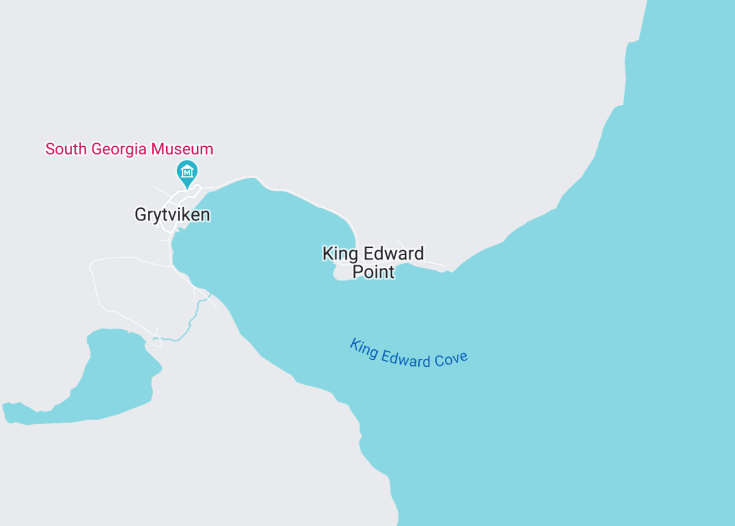Nestled in the rugged and untamed beauty of South Georgia Island, King Edward Point stands as a serene yet isolated outpost, enveloped by the vast Atlantic. Renowned for its breathtaking vistas, diverse wildlife, including seals and penguins, and poignant historical significance, it offers a unique glance into pristine natural environments and the vestiges of human exploration in the Antarctic surrounds. The site hosts a research station, highlighting ongoing scientific study, making it a fascinating destination for those inclined towards nature and science.
Ensure to comply with all environmental guidelines and regulations to preserve the delicate ecosystems during your visit.
Weather can be unpredictable; plan accordingly with appropriate gear and provisions for variable conditions.
Top things to do & see in King Edward Point
Select the following sights and activities to discover best tickets and tours available in King Edward Point.
King Edward Point: A Remote South Atlantic Haven
| Country | South Georgia and the South Sandwich Islands (United Kingdom) |
| Time in King Edward Point | GMT-2 |
| Language spoken | English |
| Population | 18 (2023 estimate – Local Government Data) |
| Currency | Falkland Islands pound (£, FKP) |
| Airports |
|
King Edward Point, referred to colloquially as KEP, is situated on the eastern coast of South Georgia Island. It functions as the capital of the South Georgia and the South Sandwich Islands—a British Overseas Territory. Historically, this location held significant importance due to its role in the whaling industry during the early 20th century, with remnants of this era still visible. Today, King Edward Point serves primarily as a research station where scientists and researchers focus on biological, oceanographic, and environmental studies. The area also serves a vital role in conserving the unique marine ecosystem and biodiversity of the Antarctic region.
Where is King Edward Point?
Located on the isolated South Georgia Island in the southern Atlantic Ocean, King Edward Point is predominantly surrounded by rough seas and rugged terrain.
What is King Edward Point Famous For?
King Edward Point is renowned for its historical significance in the whaling industry and its current role as a research hub, contributing valuable scientific data on marine life and ecological changes.
History
1900s-1950s: Establishment and Early Years
King Edward Point (KEP), located in the pristine and remote territory of South Georgia, was initially used as a whaling station in the early 20th century. Its establishment came during the height of whaling operations in the Southern Ocean, servicing various whaling fleets and acting as a hub for the industry. During this time, KEP was pivotal in supporting the booming whaling industry, which dramatically shaped the human presence and activity in South Georgia.
1950s-1982: British Research and Military Presence
Post-World War II, the decline of whaling due to decreasing whale populations and the rise of petroleum oils led to a shift in KEP’s role. The British government established a permanent presence, converting some of the existing structures for use as research bases. In 1969, the British Antarctic Survey (BAS) set up a scientific research station here, marking the beginning of KEP’s contributions to environmental and marine studies. This period also saw the fortification of British claims to sovereignty in the region, particularly during the Falklands War in 1982.
1982-Present: Conservation and Tourism
Following the Falklands War, the focus at King Edward Point shifted significantly towards conservation and scientific research. The BAS continues to use the site to conduct important research in biology, glaciology, and meteorology. Today, conservation efforts are crucial, with projects aimed at restoring the native wildlife and combating introduced species. The station also serves as a monitoring point for fishing activities around South Georgia to ensure sustainable practices. In recent years, KEP has become a point of interest for eco-tourists and adventurers looking to experience its unique environment and historical sites.
Visit King Edward Point
What to see and do in King Edward Point, South Georgia and the South Sandwich Islands (United Kingdom)
In King Edward Point, visitors can immerse themselves in a blend of breathtaking natural beauty and rich history. Key attractions include:
- The South Georgia Museum: Housed in an old whaling station manager’s house, offering insights into the area’s whaling history, wildlife, and the impact of human activity.
- Wildlife Watching: The area is renowned for its diverse wildlife, including seals, penguins, and an array of seabirds.
- Hiking Trails: Numerous trails offer stunning views of the surrounding landscapes and a chance to experience the island’s rugged beauty up close.
Festivals and Events at King Edward Point
While King Edward Point is not widely known for large public events due to its remote location and small population, the community occasionally holds small, informal gatherings and celebrations, particularly during major holidays or when research teams rotate in and out. The most likely period for such events is during the Austral summer months, from November to March, when the weather is more conducive to travel and outdoor activities.
Best time to visit King Edward Point
The optimal time to visit King Edward Point is during the Southern Hemisphere’s summer months, from November to March. During this period, the weather is relatively milder, and the daylight hours are longer, enhancing the opportunity for wildlife observation and exploration of the terrain.
Is King Edward Point worth visiting?
King Edward Point offers a unique travel experience for those interested in wildlife, history, and remote destinations. It provides a rare glimpse into a largely untouched natural environment and a deep dive into the history of whaling. However, potential visitors should be aware that access can be challenging and requires careful planning. Accommodations and facilities are limited, catering primarily to researchers and small groups of eco-tourists. For those willing to navigate these challenges, King Edward Point promises an unforgettable journey and profound insights into both natural and historical contexts.









